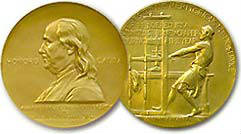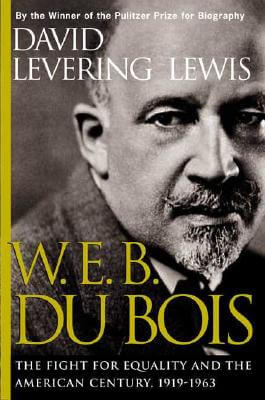Pulitzer Prize Winning Books by Black Writers (includes Finalists)
← Back to Main Awards Page
Since 1917 the Pulitzer Prize has honored excellence in journalism and the arts. The first award was presented in 1918. The Prize recognizes American authors in six “Letters and Drama” categories; Biography/Autobiography, Fiction, General Non-Fiction, History, Poetry, and Drama (technically not a book award, but plays are all available as books and have been included here).
The first African-American writer to win a Pulitzer Prize in any of the above categories was Gwendolyn Brooks who received the award for poetry for her collection Annie Allen in 1950.
One Book was a Finalist or Winner of a Pulitzer Prize in 2001
Winner – Biography / Autobiography
W.E.B. Du Bois: The Fight for Equality and the American Century 1919-1963
List Price: $35.00
Henry Holt & Company (Oct 17, 2000)
Nonfiction, Hardcover, 608 pages
ISBN: 9780805025347Publisher: Macmillan Publishers
Book Description:
The second volume of the Pulitzer Prize winning biography that The Washington Post hailed as "an engrossing masterpiece"
Charismatic, singularly determined, and controversial, W.E.B. Du Bois was a historian, novelist, editor, sociologist, founder of the NAACP, advocate of women s rights, and the premier architect of the Civil Rights movement. His hypnotic voice thunders out of David Levering Lewis s monumental biography like a locomotive under full steam.
This second volume of what is already a classic work begins with the triumphal return from WWI of African American veterans to the shattering reality of racism and lynching even as America discovers the New Negro of literature and art. In stunning detail, Lewis chronicles the little-known political agenda behind the Harlem Renaissance and Du Bois s relentless fight for equality and justice, including his steadfast refusal to allow whites to interpret the aspirations of black America. Seared by the rejection of terrified liberals and the black bourgeoisie during the Communist witch-hunts, Du Bois ended his days in uncompromising exile in newly independent Ghana. In re-creating the turbulent times in which he lived and fought, Lewis restores the inspiring and famed Du Bois to his central place in American history.
The second volume of the Pulitzer Prize winning biography that The Washington Post hailed as "an engrossing masterpiece"
Charismatic, singularly determined, and controversial, W.E.B. Du Bois was a historian, novelist, editor, sociologist, founder of the NAACP, advocate of women s rights, and the premier architect of the Civil Rights movement. His hypnotic voice thunders out of David Levering Lewis s monumental biography like a locomotive under full steam.
This second volume of what is already a classic work begins with the triumphal return from WWI of African American veterans to the shattering reality of racism and lynching even as America discovers the New Negro of literature and art. In stunning detail, Lewis chronicles the little-known political agenda behind the Harlem Renaissance and Du Bois s relentless fight for equality and justice, including his steadfast refusal to allow whites to interpret the aspirations of black America. Seared by the rejection of terrified liberals and the black bourgeoisie during the Communist witch-hunts, Du Bois ended his days in uncompromising exile in newly independent Ghana. In re-creating the turbulent times in which he lived and fought, Lewis restores the inspiring and famed Du Bois to his central place in American history.

